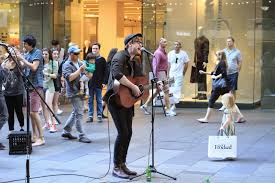“YES, BUSKING PERMITS IN THE USA ARE ILLEGAL”
YES, BUSKING PERMITS IN THE USA ARE ILLEGAL.
” busking licenses themselves are unconstitutional.In the USA, public performance is protected by the First Amendment“
http://gravitydefiance.net/wp/yes-busking-permits-in-the-usa-are-illegal/
I count myself as a veteran street performer, though by no means am I among the oldest-school of us. Having performed on the streets of fourteen cities in five different countries, I feel like I have a fairly dialed show. I have a good grasp of public space, social dynamics, crowd control, and comic timing, and on a good day I can pull a month’s rent in my hat.
It also means that I have been chased around by a lot of police and private security. Like most hecklers, they usually fall back on the same lines – “you can’t vend here, it’s a safety issue, this public street is private property” – but what they don’t know is that shutting down a street show in the USA is illegal. Not only that, but busking licenses themselves are unconstitutional.
* * *
In the USA, public performance is protected by the First Amendment. When in public, you have as much right to sing a song called “The President Is Stupid” as you have to sing a song called “Give Me A Dollar.” Singing “Give Me A Dollar” with a hat on the ground does not make you a business or a vendor, even if someone puts in money; and whether that public space is publicly or privately owned has no bearing on whether you still have your First Amendment rights while there. As a matter of fact, it is a crime to shut down a street show under the color of law — i.e. to tell you that it’s not legal to do so under the claim of any kind of legal authority. Source: Title 18, USC, Section 242: Deprivation of Rights Under Color Of Law. All this has been established and re-established all over the country by a variety of courts, including the Supreme Court, on multiple instances.
Unfortunately for street artists and our audiences, no police officer knows this. And half the time, even if shutting down a street show is illegal, they’ll still make up some other reason to cite you (in the UK, they’ve been using a literalistic interpretation of a century-old vagrancy law). And when a city council decides they’re going to limit the time, place, and manner of free expression in their towns, it’s rare that the local population of buskers can afford to spend the time and money to fight these anti-busking laws in the court.
* * *
A handful of precedents go like this:
• In 1970, Allen Ginsberg challenges and beats a 40-year-old anti-busker law in New York City, which had been established for reasons of “safety” regarding conflicts over performance space.
• In 1979, Goldstein vs. Town of Nantucket was decided in favor of a busker who successfully argued that street performance isn’t vending.
• In 2005, a street magician won over $47,000 in damages from the City of Seattle after it argued that its private ownership of a central park allowed it to place limits on street performance.
• In 2007, a visual artist’s right to sell his art at his street shows was upheld by the Supreme Court, referring to two other decisions which noted that free speech doesn’t get limited just because the speaker is financially compensated.
• In 2010, a judge threw out Venice Beach’s permit/lottery system which required buskers to buy into a lottery for space.












